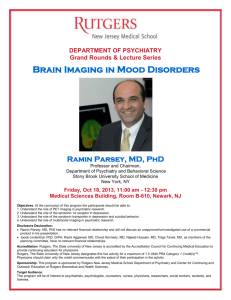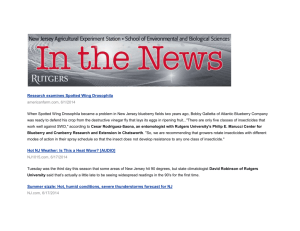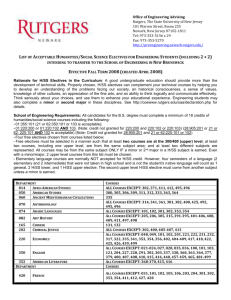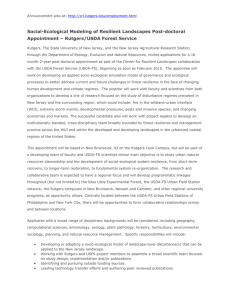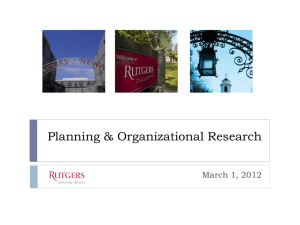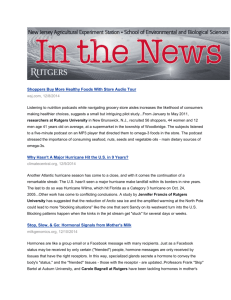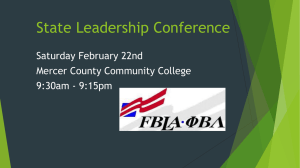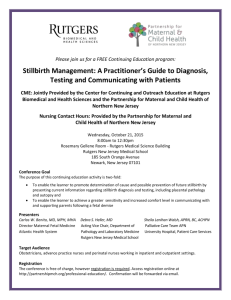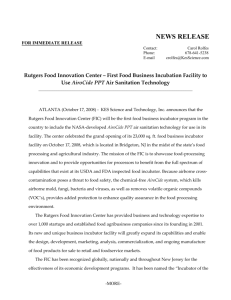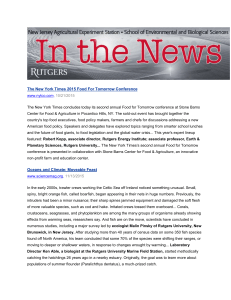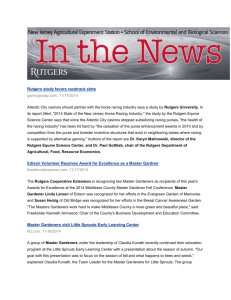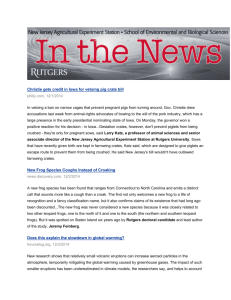11/25/2015 Forest loss accounts for approximately 10 per cent of
advertisement
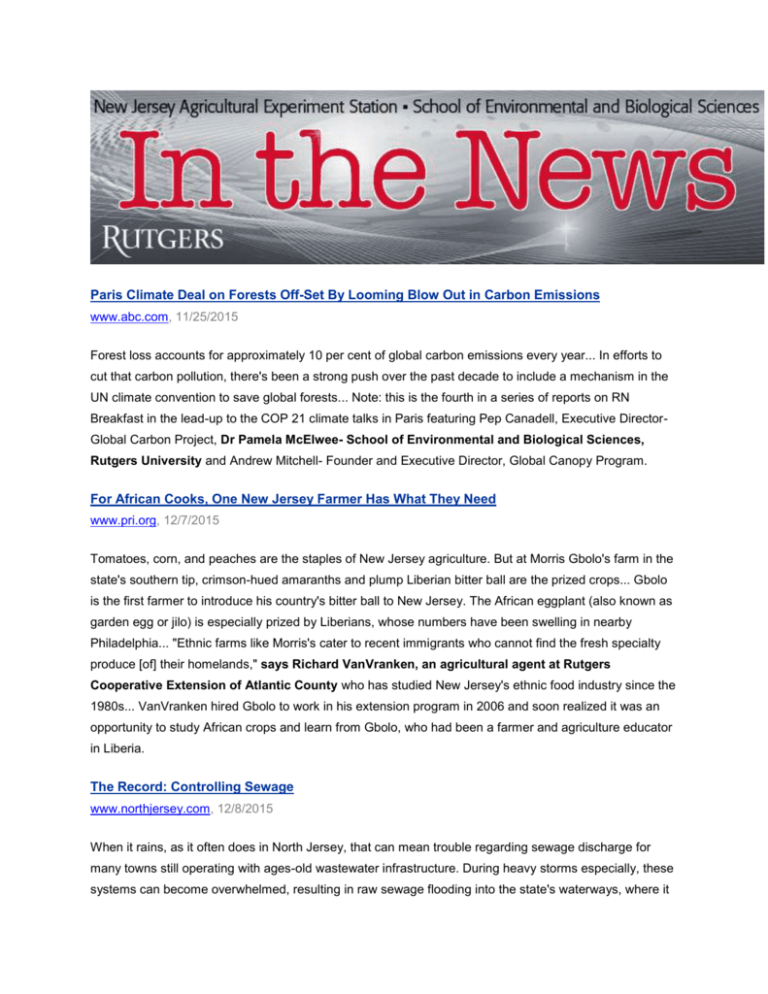
Paris Climate Deal on Forests Off-Set By Looming Blow Out in Carbon Emissions www.abc.com, 11/25/2015 Forest loss accounts for approximately 10 per cent of global carbon emissions every year... In efforts to cut that carbon pollution, there's been a strong push over the past decade to include a mechanism in the UN climate convention to save global forests... Note: this is the fourth in a series of reports on RN Breakfast in the lead-up to the COP 21 climate talks in Paris featuring Pep Canadell, Executive DirectorGlobal Carbon Project, Dr Pamela McElwee- School of Environmental and Biological Sciences, Rutgers University and Andrew Mitchell- Founder and Executive Director, Global Canopy Program. For African Cooks, One New Jersey Farmer Has What They Need www.pri.org, 12/7/2015 Tomatoes, corn, and peaches are the staples of New Jersey agriculture. But at Morris Gbolo's farm in the state's southern tip, crimson-hued amaranths and plump Liberian bitter ball are the prized crops... Gbolo is the first farmer to introduce his country's bitter ball to New Jersey. The African eggplant (also known as garden egg or jilo) is especially prized by Liberians, whose numbers have been swelling in nearby Philadelphia... "Ethnic farms like Morris's cater to recent immigrants who cannot find the fresh specialty produce [of] their homelands," says Richard VanVranken, an agricultural agent at Rutgers Cooperative Extension of Atlantic County who has studied New Jersey's ethnic food industry since the 1980s... VanVranken hired Gbolo to work in his extension program in 2006 and soon realized it was an opportunity to study African crops and learn from Gbolo, who had been a farmer and agriculture educator in Liberia. The Record: Controlling Sewage www.northjersey.com, 12/8/2015 When it rains, as it often does in North Jersey, that can mean trouble regarding sewage discharge for many towns still operating with ages-old wastewater infrastructure. During heavy storms especially, these systems can become overwhelmed, resulting in raw sewage flooding into the state's waterways, where it can create both environmental and health problems for thousands of people.. The problem is especially evident in Paterson, where antiquated pipes are connected to old sewer and stormwater systems. During heavy rains, the extra surge of water overwhelms the system, dumping a toxic mix of ordinary street pollution with sewage through 24 so-called overflow pipes that lead directly into the Passaic River... Encouragingly, Chris Obropta, an environmental sciences expert at Rutgers, has met with Paterson Mayor Joey Torres on ways the city can improve the situation. They talked about rain gardens, which Obropta said would "not only capture rainwater but clean the air and provide wildlife habitat." Saving Shore Communities a Risky, Expensive Proposition www.insurancejournal.com, 12/9/2015 The sea is rising. The land is sinking. Entire mid-Atlantic communities are anchored in between, bookended by certain disaster unless a way is found to turn back the tide and save the shore... Build levees and dikes. Erect bulkheads around entire towns. Construct dunes in the marshes to absorb flooding from the west. Transform low-lying areas into amphibious suburbs. Admit defeat and retreat... "The bayside is basically the Achilles' heel of New Jersey," said Michael Kennish, a research professor in the Department of Marine and Coastal Sciences at Rutgers University. "It's a crisis scientists are concerned about. People are more concerned about what they're going to eat two days from now."... Kennish said most experts advocate what he calls "a practical view," endorsing infrastructure improvements to stormwater drainage systems and the installation of pumping stations, along with raising roads and houses. What Are the Odds of Having a White Christmas in N.J.? www.nj.com, 12/9/2015 If you're dreaming of a white Christmas this year, you might want to hit the road and visit friends or relatives in Colorado, Idaho, Minnesota, Maine or upstate New York... Those are among the places in America with the highest probability of having 1 inch or more of snow on the ground on Dec. 25 in any given year, based on snowfall and temperature data compiled by the National Oceanic and Atmospheric Administration, better known as NOAA... During a typical year, New Jersey's northern and central regions have a 20 percent chance of having a white Christmas, said David Robinson, the state climatologist at Rutgers University. The probability is even lower in southern New Jersey, where temperatures normally run warmer. Conference Calls For Action For Healthier Children www.mycentraljersey.com, 12/10/2015 The New Jersey Partnership for Healthy Kids (NJPHK), a program of the Robert Wood Johnson Foundation, hosted the Building a Culture of Health in New Jersey Conference on Dec. 2 at the Pines Manor in Edison... "The many advocates and supporters who work diligently to make a difference in the health of our communities are to be commended for their efforts - both in the field and behind the scenes," said Anderson. During the conference, the inaugural "Culture of Health Champion Awards" were presented to four organizations/affiliations for outstanding efforts in four categories: Community: The Rutgers Cooperative Extension recognized for providing leadership, collaboration and science-based education through partners - NJPHK and Department of Health; implementation of Get Moving - Get Healthy New Jersey; and partnering in advancing environment and policy change. Whither Winter? Warm For Now, But El Nino Remains Wild Card www.philly.com, 12/11/2015 We'll be surprised if November doesn't come in as the warmest November on record worldwide in the official federal database. It already is No. 1 on the satellite list. Likewise, we expect December to finish at or near the top, and 2015 is a lock to become the warmest year on record in the National Climatic Data Center (NCDC), which dates to 1880... According to the excellent data maintained by David Robinson and his staff at the Rutgers University Global Snow Lab, November was No. 7 for area snowcoverage extent in the Northern Hemisphere in 50 years of satellite coverage. When Eating Clean Is Dirty: Chipotle, 'Fresh' Offerings and Food Safety www.usnews.com, 12/11/2015 Environment and animal rights groups have praised Chipotle for its sustainable and humane practices, but its recent food poisoning outbreaks illustrate the challenges that can come with living up to this image... E. coli outbreaks linked to food from Chipotle has been reported in nine states, infecting 52 people, though officials from the Centers for Disease Control and Prevention haven't identified what ingredient is responsible. The chain, well-known for its burritos, uses 64 ingredients from more than 100 suppliers at its 1,900 restaurants... "If you are sourcing foods from one or two suppliers it's easier to manage than if you have dozens of medium or smaller suppliers," says Don Schaffner, a food science expert and professor at Rutgers University. "They may not have the resources to do food safety." Rapid Arctic Warming Drives Shifts in Marine Mammals, New Research Shows www.phys.org, 12/14/2015 New hydrophone surveys of migration gateways to the Arctic show that recent extremes in sea ice loss has opened new waters to humpback and fin whales that once ranged through the far north only in summer. And as climate change drives the ice into further retreat, such "summer" species may begin competing with bowhead whales that once had the habitat to themselves, according to research presented at the Society of Marine Mammalogy's Biennial Conference in San Francisco this week... Jennifer Francis, a Rutgers University research professor and plenary speaker at the conference, sees potential connections between rapid Arctic warming and unusual weather patterns and climate extremes elsewhere on the globe. For instance, a so-called "warm blob" that turned the ocean off the West Coast of the United States unusually warm for more than a year may have been especially strong and persistent because of the atmospheric patterns taking hold over the Arctic, which is warming much faster than the planet as a whole. Cumberland County Hosts South American Food Industry Executives www.nj.com, 12/14/2015 Cumberland County was host to food industry executives from Brazil last week and again hosted more from other parts of South America, who came to learn more about the area's food commerce. Rutgers Food Innovation Center (RFIC) in Bridgeton coordinated the event in partnership with the Cumberland County Improvement Authority... "All together we entertained more than a dozen South American company representatives and I can honestly say each one was very impressed with our area, it's location and abundant resources - both from an agriculture and a transportation standpoint," CCIA Construction and Economic Development Director Jim Watson explained about the groups. "I expect to hear from at least of few of them after they have had a chance to process and distribute the information we were able to convey to them in such a short time span." Extreme Research Shows How Arctic Ice Is Dwindling www.nationalgeographic.com, 12/14/2015 The sea ice that blankets the Arctic Ocean isn’t the unbroken white mantle depicted in maps. It's a jigsaw puzzle of restless floes that are constantly colliding, deforming, and fracturing from the force of wind and ocean currents... Warmer air above the ocean basin is projected to spill down over the surrounding coasts of Russia, Alaska, and Canada, causing feedback effects as far as 900 miles inland, including accelerated melting of the Greenland ice sheet and large emissions of carbon dioxide and methane from thawing tundra... How a rapidly warming Arctic will influence weather across the hemisphere is a bit hazier. Atmospheric scientists Jennifer Francis at Rutgers University and Steve Vavrus at the University of Wisconsin have suggested that people in the continental United States already may be feeling the effects of melting Arctic sea ice - especially in the past two winters in the east, which made "polar vortex" household words. We invite you to send an email to InTheNews@aesop.rutgers.edu alerting us when you are quoted in a story or if your program is mentioned in the news. Please send links of news, as it happens, as some media outlets do not retain online links beyond a week. Visit the SEBS and NJAES Newsroom at sebsnjaesnews.rutgers.edu.
